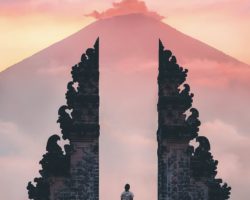
Ada had walked up the seven thousand steps unaccompanied and now she stood before the wall. It towered above her, white marble glittering in the morning light. She stood in awe of the structure, the fear that had hovered about her during her dark ascent settling upon her, soaking into her.
She had prepared for this day. She had prayed and studied and trained her soul. She had abstained and beat her body into submission.
She stood now before the gate of the God-King.
Men and women, young and old, had been offered to the God-King in his mountain-top palace. They returned terrified. They spoke of his wrath, of his great anger. Someday, he would descend the 7000 steps and tear apart civilization. He must be appeased.
Ada had come.
She had been chosen. Many had. But only she remained. The rigors of purifying oneself, of preparing oneself to be consumed by an angry god, was too much for others. For Ada, it was breath and life. She longed to look upon the God-King’s face. Her sacrifices were of her own volition. Her desires were also her duties.
She stood before the gate. She lay her hand upon it. Effortlessly, the massive panel opened.
Inside, trees lined the paved walkway. Beds of flowers lay just beyond. Through the canopy, she could see still higher peaks scrapping the blue sky. The presence of great structures, shadowing other paths and avenues, caused her to turn in a slow circle to get a sense of the scale of the residence. Birds of many colors flew among the branches. Other, larger creatures move lazily through the flowers and along the shores of lakes in the distance.
Ada stood almost frightened by the beauty.
She must not stumble at the outset. She had come to show herself to the God-King. She started forward along the path.
She emerged from the trees. The palace spread before her, loomed above her, enclosed her, drew her forward by its weight. Block by block it ascended, block by block it sent out its tendrils as if to encircle the earth or cut it off and strangle it. Before her, a river ran swift and smooth and deep. A narrow walkway crossed it and led to the towering entryway that seemed like a maw opened to inhale the world.
This was her purpose, to cross the threshold between man and God and reconcile the two.
Beneath the entrance, beneath the pillars, within the hall dark and cool as shade, as blind and cold as night, as warm and still as summer’s midnight, she walked. Behind her, the portal of light grew smaller and dimmer. Before her, a pale glow, like sunlight through thick curtains, grew.
She stopped. She stood before steps. At the top of the seven steps sat a throne. Upon the throne was a man in deep darkness.
He stood. He was tall, taller than a man, and even in the gloom she knew he was strong and that upon his head was a heavy crown. The blaze of stars touched his eyes and flashed upon her from a face veiled in darkness.
Ada knelt. “My Lord, I have come.”
“Will you look upon me?” The voice was firm, but not unkind.
“If you wish it, My Lord.”
“If you look upon me, you shall see yourself, for I am Truth, and here there can be no lie.”
“I understand, My Lord. I have prepared.”
He was silent. When Ada raised her eyes, he was watching her. She met his gaze to show she was not afraid, to show she was ready and willing–compliant, obedient, but resolute.
The God-King returned to his throne. He reached for something Ada could not see, but that she saw later–a cord. He pulled it and light shattered the throne room. Ada gasped at the weight of it and she saw the God-King and she closed her eyes and turned away and she lay as if dead. She wept and could not stop weeping.
She heard his voice, eventually. She hated it; she hated herself. His hand, strong and burning, touched her. She scrambled away. How could he touch her, speak to her, exist near her? Her preparation, her purity, her poise, her devotion, her destiny– it was rebellion, blasphemy, pettiness, and wickedness.
“You must look at me again. Or you must leave.”
“I will die.”
“You will not.”
“Let me leave.” In the gardens, she could worship him. Outside the wall, back in her village, even, maybe, in the darkness here, she could worship him, if he would go from her. But she could not stay.
“I will put you on my throne,” he said.
“No.”
“I will open the veil.”
“No!”
She had backed against a pillar. She would stand and run.
“Did you not come to see the God-King?”
That–that alone–kept her. Every pretension, every preparation, had withered, but the seed remained. Her whole life was rooted in the God-King. She could abandon everything, or she could follow through to the horrific end.
He lifted her in his arms. She trembled uncontrollably, thrashed against him, moaned. He placed her in his throne and she sat, terrified, as before her executioner.
“Look upon me as I look upon you. See as I see.”
His hand again pulled the cord. Light suffocated her, rushed into her nose and mouth and ears, drowned her lungs. Tears filled her eyes. She blinked them away.
He stood at the bottom of the steps like a tower of stone in an ocean, like a fountain of water in a desert, like the sun in the black void.
Ada looked upon him, and he looked upon her, and what she was did not matter any longer, for she saw that he saw her and that he knew her and that he stood where she had stood and that she was in his throne and in his light and in his eyes.